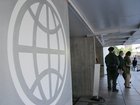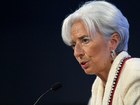Australian Treasurer Wayne Swan on Thursday conceded for the first time he was unlikely to deliver a budget surplus this financial year, a backdown the opposition called "humiliating".
Earlier this year, Swan declared the "deficit years of the global recession" over and since then he has insisted a surplus was on the cards, despite plunging commodities prices sending clear signs that all was not well.
 Full Story
Full Story
Hong Kong's de facto central bank said Thursday it would probe UBS over possible rigging of the city's interbank offered rate, a day after the Swiss giant agreed to pay a huge fine over the Libor scandal.
The Hong Kong Monetary Authority said it has received information from overseas regulators about "possible misconduct" by UBS involving submissions for the city's interbank rate, known as Hibor, and other reference rates in Asia.
 Full Story
Full Story
The European Union welcomes Russian President Vladimir Putin on Thursday, highlighting its partnership with a Moscow determined to forcefully defend its interests against Western interference.
EU officials described the 30th EU-Russia summit as topping "15 years of intense summitry" between "indispensable partners" in a changing world.
 Full Story
Full Story
U.S. photography giant Eastman Kodak said Wednesday it had agreed sell its digital imaging patents for $525 million to help it emerge from bankruptcy protection.
Kodak said 12 intellectual property licensees, led by Intellectual Ventures and RPX Corporation, will buy the patents.
 Full Story
Full Story
Japanese automaker Nissan said Wednesday it would start building a compact model of the luxury Infiniti brand at its huge plant in Sunderland in the north of England from 2015.
Production of the new vehicle would create another 1,000 jobs across the country, including 280 additional positions at the Sunderland plant, with a capacity to make about 60,000 Infiniti models annually.
 Full Story
Full Story
Philippine President Benigno Aquino on Wednesday signed into law a 2.005 trillion-peso ($49 billion) budget for 2013, vowing to use higher taxes on tobacco and alcohol to boost programs to reduce poverty.
Education, health, agriculture and a cash-transfer scheme for the poor are the key priorities of the appropriations, which are 10.5 percent higher than the 2012 national budget, he said during the signing ceremony.
 Full Story
Full Story
Monetary policy easing in the G3 countries may lead to excessive credit growth and the creation of asset bubbles in East Asia and Pacific (EAP) as investors flock to the region, the World Bank warned Wednesday.
In their East Asia and Pacific Economic Update, the World Bank said recent central bank easing in Japan, the U.S. and the eurozone may redirect capital to the EAP, which could cause more harm than good for the region.
 Full Story
Full Story
Swiss banking giant UBS has agreed to pay around $1.5 billion to British, U.S. and Swiss regulators to settle allegations it manipulated Libor interest rates, it said in a statement Wednesday.
"UBS agrees to pay approximately CHF 1.4 billion in fines and disgorgement to U.S., UK and Swiss authorities to resolve LIBOR-related investigations," the statement said.
 Full Story
Full Story
The International Monetary Fund disbursed a fresh $1.17 billion (890 million euros) to Ireland on Monday, approving the country's progress under its two-year-old rescue program.
The IMF said that Ireland had pushed ahead with policy reforms and deficit cutting despite a slowdown in growth this year.
 Full Story
Full Story
Renault will sign a pact Wednesday to build its first plant in Algeria during a highly symbolic visit by President Francois Hollande to the former French colony, a company spokeswoman said.
"Renault will sign the agreement tomorrow," she said, confirming press reports.
 Full Story
Full Story



